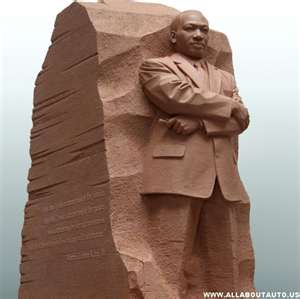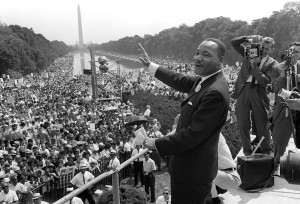Audio clip: Adobe Flash Player (version 9 or above) is required to play this audio clip. Download the latest version here. You also need to have JavaScript enabled in your browser.
Martin Luther King Jr. was as clear a voice for justice as this country has had. Fiercely pro-union, he was killed in Memphis while assisting striking sanitation workers.
48 years ago, King’s “I Have a Dream” speech stirred the conscience of the country, and moved the hundreds of thousands who had gathered on the National Mall that day, including a 20-year-old by the name of Vincent Gray. Today, Mayor Gray serves as the District of Columbia’s highest elected official. And he is, in my opinion, one of the most serious public servants this country has to offer. But when it comes to a certain multinational corporation’s attempt to enter the District in a massive and unprecedented manner, Gray has turned a blind eye to the potential downside.
“Walmart is the world’s largest retailer with more than 4,300 stores in the United States and over 8,000 worldwide, with global sales topping $400 billion in 2009… Walmart’s formula for financial success includes: low-wage labor, limited health benefits, and leveraging of government subsidies,” states a 2010 joint study by Hunter College and New York City Public Advocate Bill de Blasio, which included “the first research conducted regarding [the effect of] Walmart in a major U.S. City: Chicago.”
Aug. 10, Gray stood side by side with civil rights leaders at a press conference in front of the not-yet-unveiled Martin Luther King Jr. Memorial.  At a press conference the following day, Gray stood alongside Walmart executives to announce a $3 million job training grant from the Walmart Foundation. (This is just the latest example of the Walmart Foundation’s largesse towards local nonprofits at the very time the company is attempting to bring four or more stores to the District.)
At a press conference the following day, Gray stood alongside Walmart executives to announce a $3 million job training grant from the Walmart Foundation. (This is just the latest example of the Walmart Foundation’s largesse towards local nonprofits at the very time the company is attempting to bring four or more stores to the District.)
The back-to-back press conferences struck me as being paradoxical and I asked Gray what he thought King would say about Walmart’s attempt to come to D.C. Gray said, “To the extent I can speculate, [I think King] would talk about the importance of having a fair wage for the people who work there, a comparable wage, having benefits for people. And we’ve said the same things to Walmart.”
I then asked the mayor if he’d read the New York City Public Advocate’s report and was surprised to learn that he hadn’t. Gray stays up late into the night reading and he doesn’t move forward on important issues without doing his homework. Yet, regarding Walmart’s attempt to enter D.C., the mayor appears to be flying blind, or maybe worse, only getting one side of the story.
With so much at stake, Gray would do well to get the other side. Here are some of the key findings from New York City Public Advocate’s report:
Walmart store openings kill three local jobs for every two they create. (That’s a different conclusion than the mayor’s: “We think that [Walmart] will bring additional jobs,” he told me.)
Walmart’s arrival in a new market has a particularly damaging effect on ethnic retailers including supermarkets, bodegas, electronics and furniture stores. (Gray: “We don’t see anything likely to shut down as a result of Walmart coming.”)
Walmart is trying to take advantage of the current economic downturn by promising an immediate infusion of jobs and investment dollars in city neighborhoods that have been hit hard by the recession. Considering the body of independent research that clearly demonstrates Walmart’s negative long-term impacts on local economies, it would be shortsighted to allow this destructive retail monopolist to enter the New York City market via the Trojan Horse of “job creation.”
And then there’s this ugly reality, which I don’t think King would be silent on:
Walmart’s power to sell products below their typical market value has led to the laying off of employees and the closure of U.S. plants in favor of outsourcing products from overseas. Eighty-five percent of Walmart’s items are made overseas. The mega-retailer has faced numerous accusations of unacceptable conditions in factories of their suppliers. Reported abuses include: “forced overtime, locked bathrooms, starvation wages, pregnancy tests, denial of access to healthcare, and workers fired and blacklisted if they try to defend their rights.”
I believe there are other grounds upon which King would oppose Walmart’s entry into the District, including where the company’s profits end up. The Waltons are one of the richest families on earth because Walmart extracts far more than it provides to the communities in which it operates. This flies directly in the face of one of King’s top priorities in the last years of his life. Through Operation Breadbasket, King worked tirelessly to keep money from leaving the African American community.
If King were alive, and found it impossible to stop Walmart from coming to D.C., he would likely be on the front lines of pushing to unionize the company. In 1967 he said, “[T]he problem of transforming the ghetto, therefore, is a problem of power… Walter Reuther defined power one day. He said, ‘Power is the ability of a labor union like UAW to make the most powerful corporation in the world, General Motors, say, ‘Yes’ when it wants to say ‘No.’ That’s power.”
Thanks to the new memorial, King now resides in the District. It’s not clear that D.C. is big enough for both him and Walmart. But if Walmart does come then maybe King’s definition of power should be brushed off, updated, and put to good use: Power is the ability of a labor union like the AFL-CIO to make one of the most powerful corporations in the world, Walmart, say, ‘Yes to unions’ when it wants to say ‘No.’ That’s power.
* This piece was edited slightly since its original posting.
Related Links:
Related Stories:
- Where’s Walmart?, 4/28/11
- Busboys and Poets Owner Andy Shallal Says Four Walmarts in D.C. Would Be Devastating, 4/4/11
- Yes! Says No to Walmart, 2/21/11

